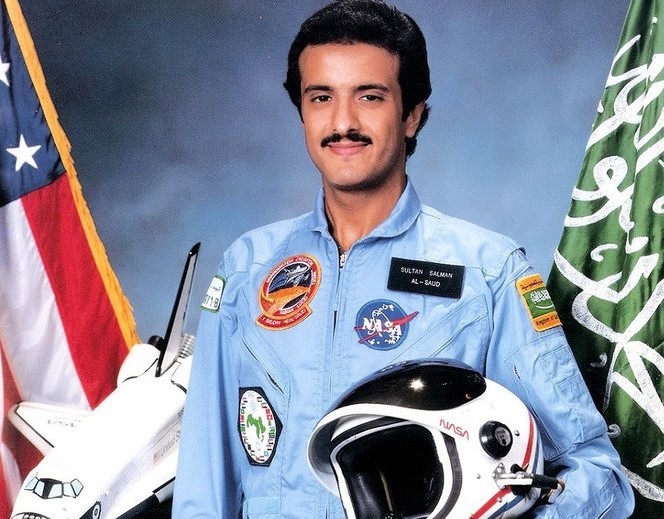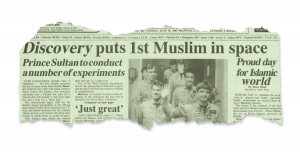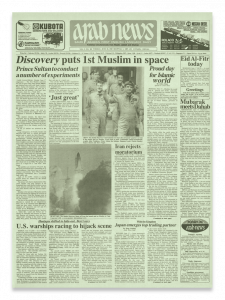- ARAB NEWS
- 04 Jul 2025

Dr. Eng. Mohammed Nasser Al-Ahbabi
Prince Sultan’s NASA mission inspired a generation of Arabs, including UAE astronaut Hazza Al-Mansouri
Summary
On June 17, 1985, history was made when the NASA shuttle Discovery blasted off from Cape Canaveral, Florida, on its fifth mission, carrying the first Arab, Muslim and royal astronaut — and, along with him, the seeds of a new era of Arab space exploration.
Royal Saudi Air Force pilot Prince Sultan bin Salman, 28, the son of Saudi Arabia’s King Salman, spent seven days conducting experiments in space as part of an international crew of seven.
During Discovery’s voyage, Prince Sultan also monitored the deployment of Arabsat-1B, the second satellite to be launched by the pan-Arab organization, designed to boost telephone and television communication between Arab nations.
After the space shuttle touched down at Edwards Air Force Base in California, Prince Sultan, having inspired a generation of Arabs to turn their eyes toward the stars, returned to a hero’s welcome in Saudi Arabia and the wider Arab world.
UAE SPACE AGENCY: The history of the Arab world in astronomy dates back to the 9th century, when Arabs were renowned for their work during the Islamic Golden Age. During this time, the House of Wisdom, which supported astronomical research, was established in Baghdad by the Abbasid caliph, Al-Ma’mun.
Arabs and Muslims have a great legacy in astronomy, with a large number of astronomical works available to date.
In the late 8th century, Muhammad Al-Fazari was the first astronomer to build an astrolabe as an aid to finding the qibla; in the 9th century, Muhammad Al-Khwarizmi developed the book “Zij Al-Sindhind,” which contains tables for the movements of the sun, moon and planets; and in the 11th century, Omar Khayyam documented the most accurate year length.
Long after the Islamic Golden Age, Arabs have reclaimed their tradition in astronomy, reviving the space sector in the region.
On June 17,1985, Saudi Prince Sultan bin Salman became the first Arab and Muslim to travel to space, spending seven days in orbit and helping to deploy a satellite for Arabsat with NASA. The prince served as a great inspiration, making a mark in the region and the entire world.

‘Prince Sultan bin Salman, now orbiting the Earth aboard Discovery, said today he was doing ‘just great.’ The view of Earth is ‘fantastic,’ he remarked.
From a story on Arab News’ front page, June 18, 1985
Prince Sultan’s experience had a great impact on the UAE, in particular, a country that has demonstrated a strong commitment to space since the time of Sheikh Zayed bin Sultan Al-Nahyan in the 1970s. Then, the visionary Sheikh Zayed met three astronauts from the Apollo 17 mission team: Gene Cernan, Ronald Evans and Harrison Schmitt. Sheikh Zayed played a key role in driving the
UAE’s interest in space and emphasized the importance of exploring space for the benefit of humanity.
In 1988, Sheikh Zayed met with Prince Sultan following his return from space, and asked about the smallest details of the prince’s journey. Sheikh Zayed saw incredible potential in exploring space and also had a far-sighted vision of the UAE’s capabilities in the space sector. The UAE, proud of Sheikh Zayed’s avant-garde thinking, embraced his vision of exploring space.
Sheikh Zayed’s vision and Prince Sultan’s historical milestone were the stepping stones for driving the UAE and the region’s enthusiasm in exploring space. Since then, the UAE has been working on ambitious space projects, establishing a leading position for the region within the global space sector.
The UAE has made major achievements in the space sector, which include establishing the UAE astronaut program, launching 10 satellites, signing more than 30 agreements to support the space sector, and attracting investments worth $6 billion in the space economy.
Prince Sultan and his Saudi Air Force backup, Major Abdul Al-Mohsin Hamad Al-Bassam, arrive in the US to begin intensive training for the space shuttle mission.

Prince Sultan blasts off from Cape Canaveral on board the Discovery, becoming the first Arab in space.
Discovery’s crew deploys the Arabsat-1B satellite.
After orbiting Earth 111 times and traveling more than 4.6 million km, Discovery lands at Edwards Air Force Base, California.

Syrian Muhammed Faris becomes the second Arab in space, flying to the Soviet Mir space station.
Prince Sultan is appointed chair of the new Saudi Space Commission.

Emirati Hazza Al-Mansouri carries the UAE flag to the International Space Station on an eight-day mission, becoming the third Arab astronaut in space and the first Arab astronaut to set foot on the International Space Station.

Scheduled date of the launch of the UAE Space Agency’s Mission Hope probe to Mars, the first step toward a planned human colonization of the Red Planet by 2117.
Among the UAE’s great milestones was the launch of the first Emirati astronaut into space. Hazza Al-Mansouri traveled to the International Space Station (ISS) in September 2019, carrying out experiments and inspiring UAE youth to become future space pioneers.
Al-Mansouri’s passion for space and desire to pave the way for future generations to explore it was brought on by Prince Sultan. As a young student, the future astronaut saw a photo of Prince Sultan, the first Arab in space, in his fourth grade schoolbook — a turning point in his life.
Since then, Al-Mansouri pursued his dream of exploring space. He was not only the first Emirati and third Arab to travel into space, but also the first Arab to make the journey to the ISS. His mission came 30 years after the launch of Syrian Mohammed Faris into space in 1987, and 32 years after Prince Sultan traveled to space in 1985.
Al-Mansouri was selected as part of the UAE astronaut program, which is developing a national team of astronauts to take part in scientific and manned space missions. In its first round, the program received more than 4,000 applicants, highlighting the passion of the UAE’s youth for the space sector.
As a young student, Al-Mansouri saw a photo of Prince Sultan, the first Arab astronaut, in his fourth-grade schoolbook, which was a turning point in his life.
Dr. Eng. Mohammed Nasser Al-Ahbabi, Director General, UAE Space Agency
The second round of the program has also gained interest among people from different backgrounds and various age ranges, with the youngest applicant just 17, while the oldest is 60.
Following the success of Arab astronauts, the UAE is continuing its work to enhance the Arab world’s leading position in space, and is planning to launch the Emirates Mars mission this year to help gain a better understanding of Earth and its atmosphere.
As part of its efforts to encourage collaboration among Arab countries and enhance the Arab world’s contribution to the global space sector, the UAE has launched the Arab Space Cooperation Group to consolidate Arab capabilities in the space industry, and enhance the region’s contribution to science research and development.

The UAE and Saudi Arabia share a mutual interest in the space sector and an eagerness to share knowledge and experience. Recently, the UAE Space Agency signed an agreement with the Saudi Space Commission, chaired by Prince Sultan to further cooperation in space activities for peaceful purposes, building technical and scientific capabilities, and exchanging knowledge and expertise.
Following Prince Sultan’s footsteps in space is essential for driving innovation, raising people’s awareness of the space sector, and inspiring youth to follow the same path — a key to having more Arabs join the world’s best astronauts.